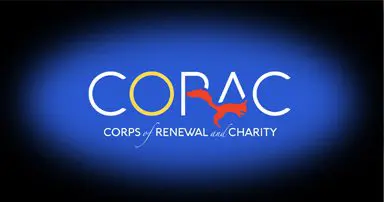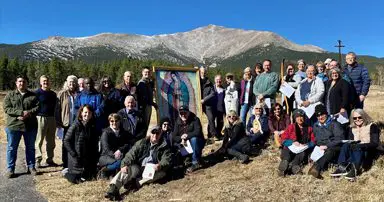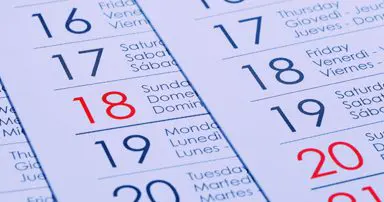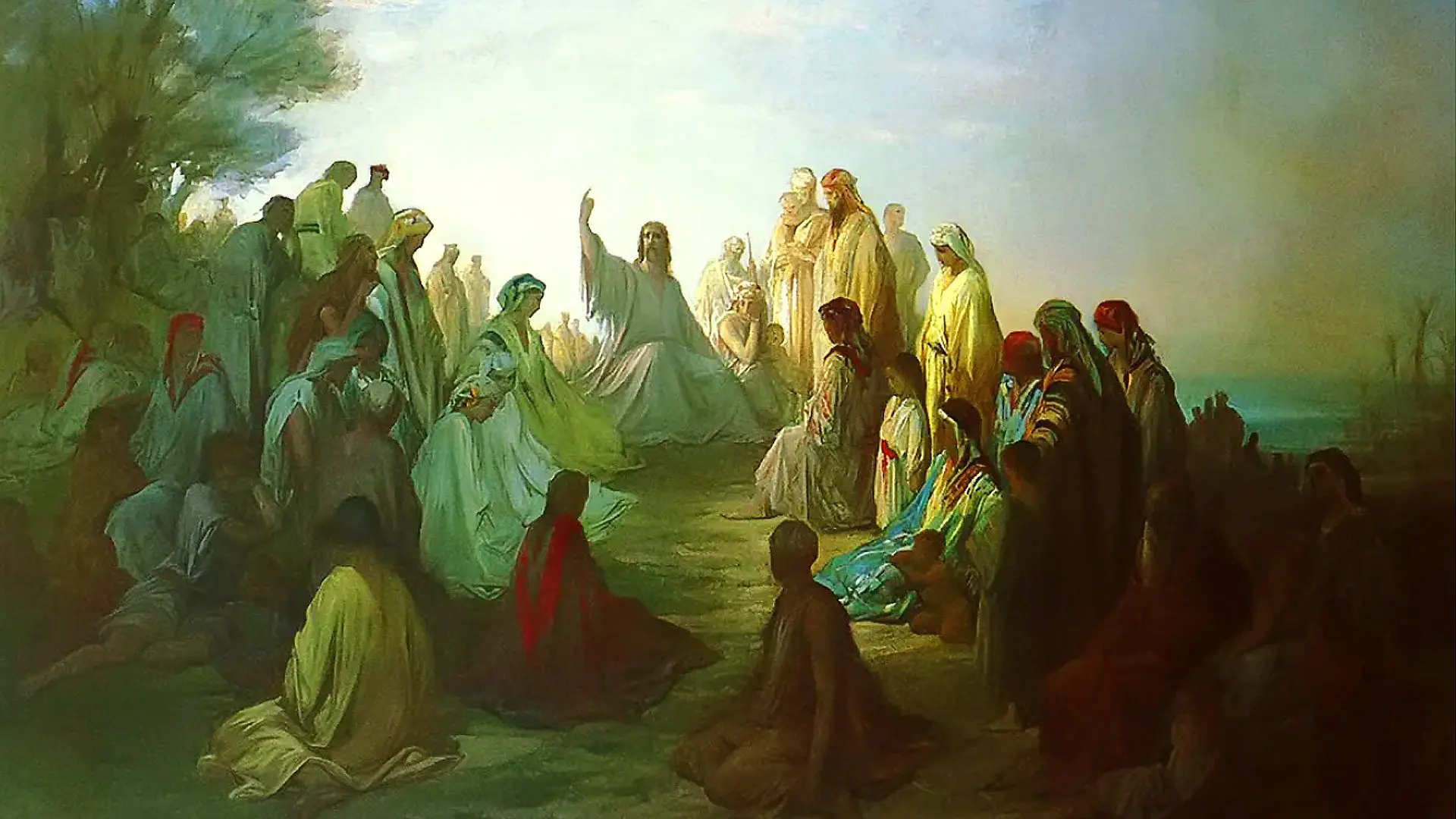(I have some thoughts that occurred to me during my contemplations at Mt. Meeker Monday. But I will let them gestate for a time. I thank all of you who stopped by – and apologize for not visiting with you. I heard and saw some of you from the grounds. I was enjoying the silent contemplation and meditation. I was aware of you, though, and I appreciate those of you who joined, for a time, in that meditation. I wrote the bulk of the piece that follows last week. I hope it is useful to you.-CJ)
By Charlie Johnston
In this Octave of Easter I find myself thinking a lot about what seemed to me to be Pontius Pilate’s plaintive question, “What is truth?” Most believe it to be entirely cynical, but given Pilate’s efforts to avoid crucifying Jesus I can’t help but feel some longing for the truth about truth in there. Regardless, it is a good question.
In the two decades before I converted to Catholicism I read the whole Bible through relentlessly, over and over. I struggled with many things, including how to reconcile the many contradictions and errors. I had relatives who, whenever confronted with an undeniable case of such, would make metaphorical excuses or just get mad and tell me I did not have spiritual eyes to understand. I’m not big on playing “let’s pretend” to justify my pious yearnings, so I muddled on, still wrestling. Of course, I never doubted Christ during this time. If I had, He probably would have given me the old Gibbs slap across the back of the head. Him I knew. It was the Bible that gave me fits.
I also hated people quoting snippets of Scripture to make their own partisan point, while studiously ignoring the parts of Scripture that completely contradicted that point. In my mind, it either all held or none of it held. Just because a system is internally coherent does not mean it is true, but if it is internally incoherent it can’t be true. I mellowed a bit on that as I realized that, for most of these people, the contradicting snippets of Scripture against what they wanted to believe just did not register with them. When I would bring them up there would usually be sincere bafflement, which would sometimes lead to deeper contemplation. Sometimes there would just be anger, as some people loathe for the edifice they have created in their mind out of their snippets to be challenged in any way – not even by Scripture, itself.
My problem with factual errors and contradictions came to an end in the summer of 1990, when reading St. Augustine’s Confessions. Finished in 400 A.D., at an early point in the work, he chided those who misuse Scripture as mere history or mere science. “It is,” he wrote, “the word of God given for your salvation.” He added that it can only be interpreted with that interpretive lens paramount.
This set off one of the biggest light bulbs in my head ever. I contemplated that Jesus IS God. Therefore, in contemplating His personality, we also saw the personality of the Father. (“He that has seen me has seen the Father.” – John 14:9). Jesus often spoke in parables to illustrate what He wanted His hearers to understand, so the Father surely does the same. I looked at my earliest problem – the story of creation in Genesis. It is not a story of creation; it is two carefully intertwined and contradictory stories of creation. A single narrative may contain differing perspectives, but it cannot contradict itself. In the first chapter of Genesis, God creates all the animals and plants first and then, as the crown of creation, man last of all. In the second chapter of Genesis God creates man first, then the animals and, in fact, had man name them as God created them. After reading St. Augustine, I abandoned my focus on the details and looked at the larger sweep – which was that all things were created by God, all things created by God are good (when properly ordered), and that man was created in God’s own image and given dominion over all things. This dominion confers both authority over all things and responsibility to God for stewardship. I kid you not: a joyful cry leapt from my throat. I spent several days looking up things that had been problematic to me – and seeing the deep, underlying message it taught for our salvation. I had no more problem with Scripture. It all held. Rather, I realized I had been like a clod who, if he had been standing before Christ as the Lord began a parable, might demand to know the man with two sons’ name and address and their ages. I was so scrupulous about the details I was missing the transcendent message. And so, I understood a little better what truth is.
As some of you know, my reading of St. Augustine’s Confessions was the catalyst that led me to seriously examine the Catholic Church, ultimately being joyfully received into the Church at the Easter Vigil in 1991. I still get annoyed with the sort of bumper sticker theology that so many spout, emphasizing one snippet while ignoring all that seemingly contradicts it. But that is a fault of the legion of vain interpreters, not of Scripture.
About a year into the faith I read the full catechism. Though I had long since read many Church Fathers, Encyclicals, and the full Documents of Vatican II, the catechism was a revelation, too. (I would advise you, if you take up the catechism directly, get an edition printed before this Papacy. For good or ill, Pope Francis has unilaterally ordered some changes to the catechism that contradict prior teaching. A Pope does NOT have that unilateral authority.) The revelation was that what I had thought was my own idiosyncratic and original interpretation of Scripture from my relentless reading and re-reading of the King James Version (KJV) of the Bible was largely actually routine Catholic Doctrine, as expressed in the Catechism.
In 1980, yet a decade before my conversion, my parents came to realize that I was very far away from some of the doctrines they espoused. That separation had actually happened some eight years earlier, but my parents were good, honorable people and I had seen no reason to make a stink. But I believe what I believe. If I am to be condemned, it will be for what I believe, not for pretending to believe what someone else told me I must. I wrote my folks a long letter explaining what I actually thought. One of the things that irritated me was how their denomination so impoverished the concept of the Word of God. They believed it just referred to the Bible – and frankly, most only accepted the KJV, at that. I wrote them that, in fact, Jesus Christ is the Word – the single Word the Father ever spoke. He walked among us for a time, but ever since His Ascencion (and before His birth, for that matter) the Holy Spirit carries the Word far and wide throughout the world. I wrote that the Word is present in everything, the coffee cup with which you greet the day, the telephone wire that carries your words to others and upon which the birds rest. The Word is always right at hand to us, if we would only call on it and perceive it. Yes, I said, the Word is close at hand uniquely in the Bible – but that is just the gateway into its fulness. You can imagine the chills I felt when, in the catechism, I read Part I, Section I, Chapter Two, Article Three, Item 102: “Through all the words of Sacred Scripture, God speaks only one single Word, his one Utterance in whom he expresses himself completely.” When seekers converge on the truth separately, they rejoice together on finding it.
This cemented one of my core, foundational convictions: Truth WILL stand the test of examination. Seek and ye shall find. Seek rigorously. To do otherwise is to doubt that God can stand the test of examination. Oh, you of little faith! Do not scorn your errors and misunderstandings: they are the branches and boulders by which you lift yourself ever nearer to truth. You only need scorn when you quit examining.
In all the RCIA classes I have taught, in all my writings, in all my talks, I both overtly encourage people to speak candidly about what troubles them and use some tricks to signal that no one is going to offend me by asking a serious question or challenging honestly what I say. Truth will stand the test of examination and we have to get to the nub of a man’s doubt, to find where the shoe pinches, to seriously begin the examination. I literally HATE it when people are silent of their real concern for fear of offending another one’s religious sensibility or, worse, triggering the ire of some religious scold. Truth will stand the test of examination – and the corollary is that if you never rigorously begin the honest examination you will never draw closer to truth.
I was now closer to the truth. In truth, though, I had mainly discerned a method for fruitfully drawing nearer to truth, anchored by the iron dictum that truth will stand the test of examination. Anyone claiming to be the final arbiter of truth or suppressing examination thereof is a liar. Thus, anyone claiming “hate” speech, suppressing “disinformation,” or otherwise censoring others is, at best, a pompous ass and, at worst, a malignant tyrant. They fear the truth – and want you to do the same.
Bearing the tools of our examination the question still remains, what is truth? It is one of the greatest questions alongside of, what is the good? In fact, truth is the most important tool in discerning what the good is.
So, what is the good? Is it the pursuit of happiness? That depends on how you define happiness. Illicit use of drugs, alcohol, sex and many other things can make you transiently happy – but at the cost of mounting misery later. Jesus tells us to “bear fruit that will last.” How, then to bear fruit that will last? Most of the great philosophers, including the greatest of all, Jesus Christ, advise us to live a well-ordered life that respects the just claims of others. Christ sums it up with what is called the golden rule – do unto others as you would have them do unto you.
In modern times the noxious notion of “my truth” has arisen, a belief that whatever I want and I believe is true to me and that you have no right to question it. Followed to its logical end it means we can have no quarrel with Ted Bundy, John Wayne Gacy, Charlie Manson or any other murderous monster, great or small. They were just living “their truth.” It is a formula for moral and philosophical anarchy. Truth must be objective or it is just an appetite writ large. Adherents of the “my truth” nonsense (which would make a sophist blush) try to say that, well, it only applies where you do not harm another. Sorry, as John Donne said, “no man is an island, entire of itself.” All our actions affect those around us. You cannot insist on objectivity when it suits you and toss it when it constrains your appetites. Unless you are one of those monsters I spoke of.
All the definitions of truth I have ever seen, save one, fall short of the mark. I have come to believe that we can never fully grasp truth, but we can approach ever nearer to it. Jesus said that you will know a tree by the fruit it bears. All the tyrannical definitions of truth, all the poseurs who claim truth is whatever they say, all the pseudo-sophisticates who claim situational definitions of truth to justify their appetites…all these bear the toxic, rotten fruit of misery and dissipation. The Truth I seek and follow is the Truth that brings dignity and freedom to humanity, that is the seed of western civilization, which brought prosperity and liberty to hundreds of millions.
Jesus Christ is the Truth. He is not my truth. He is THE Truth.
Inquire of Him. He has promised that if you seek, you shall find. It is not an idle promise.

If communication goes out for any length of time, meet outside your local Church at 9 a.m. on Saturday mornings. Tell friends at Church now in case you can’t then. CORAC teams will be out looking for people to gather in and work with.
Find me on Twitter at @JohnstonPilgrim
The Corps of Renewal and Charity (CORAC)
18208 Preston Rd., Ste. D9-552
Dallas, Texas 75252
























Dear Charlie, I love this clear and concise explanation.
Jesus really is our all in all: He is the Word, He is the Truth and He is our Way to heaven.
Thank-you for stating this so succinctly.
God bless us, every one!
Katey in OR✝️🙏🏽
As always, Charlie, very edifying, thank you!